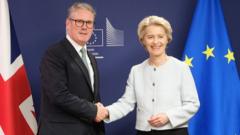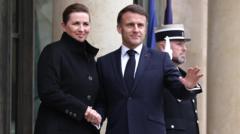As the UK prepares for an informal summit with EU leaders in early 2025, there is optimism for a reset in relations, but skepticism remains about the UK’s willingness to negotiate meaningful trade-offs.
UK-EU Relations on the Brink of Change: A 2025 Outlook

UK-EU Relations on the Brink of Change: A 2025 Outlook
An exploration of the anticipated shift in UK-EU relations as the UK government, under Labour's leadership, looks for a fresh start amidst global tensions and economic concerns.
The UK government is gearing up for a critical informal summit with European Union leaders in February 2025, marking a significant moment since the bitter Brexit negotiations. Following Labour’s electoral victory, Prime Minister Sir Keir Starmer aims to reshape relations with the EU, focusing on security and defense cooperation amid a volatile global landscape characterized by conflicts in the Middle East and tensions with Russia.
Donald Trump's potential return to the White House adds to the uncertainty, with threats to impose punitive tariffs on imports that worry both the EU and the UK. This context has prompted both sides to reevaluate their shared values and strengthen ties. The Labour government recognizes that addressing key issues like the economy, defense, and migration is intertwined with EU relations to fulfill its domestic agenda.
The Labour Party has committed to an ‘ambitious reset’ of UK-EU relations, a sentiment echoed through various diplomatic engagements since their election. Foreign Secretary David Lammy and Chancellor Rachel Reeves have conducted meetings, emphasizing the government’s intent to foster goodwill with EU partners.
Yet, skepticism lingers regarding the real implications of this reset. Observers note the UK’s insistence on maintaining the tough post-Brexit regulations raises questions about the extent of genuine compromises it is willing to make. Senior EU diplomats underscore the ambiguity surrounding the UK’s interests, indicating that a meaningful rapprochement will require a clear articulation of the trade-offs the UK is prepared to offer.
Defense and security cooperation appears to be the most plausible avenue for immediate collaboration, involving ongoing discussions about sanctions related to Russia and bolstering Europe’s military capabilities. However, the proposed agreements are expected to be informal, suggesting no substantial rollback from Brexit in these discussions, which could ease domestic political criticism.
While Labour has pledged to “make Brexit work,” many uncertainties remain regarding trade and economic gains, especially in light of the UK’s persisting reluctance to engage in deeper economic integration with the EU. EU officials have expressed confusion over the UK’s contradictory stance of seeking a reset while simultaneously maintaining strict post-Brexit boundaries, as new studies reveal limited economic incentives without revisiting customs union or free movement policies.
As for contentious issues like fishing rights and a proposed Youth Mobility Scheme, Labour’s government may explore concessions, despite firm opposition to reinstating free movement. The government could leverage these discussions to secure its core proposals, which include easing professional qualifications’ recognition and easing mobility for UK artists in the EU.
Additionally, the two parties are recognizing the pressing need for cooperation in vital sectors like energy and climate policy, which could yield significant savings for consumers and businesses alike. However, the Brexit aftermath still casts a long shadow over negotiations, with both sides treading carefully around sensitive topics like illegal migration and public sentiment.
Polling data reveal a striking disconnect between public and political perspectives, with a majority of voters in both the UK and EU supporting stronger ties and even reintroducing freedom of movement under specific conditions. This growing public mood contrasts with the more cautious approach of government leaders, who are grappling with how to navigate complex negotiations while catering to their respective electorates.
As geopolitical challenges continue to unfold, the forthcoming months will present opportunities and hurdles for the UK and EU as they navigate this delicate yet momentous juncture in their relationship. Whether the political class can adapt to the changing tide of public opinion remains a crucial question as they look toward 2025 and beyond.





















